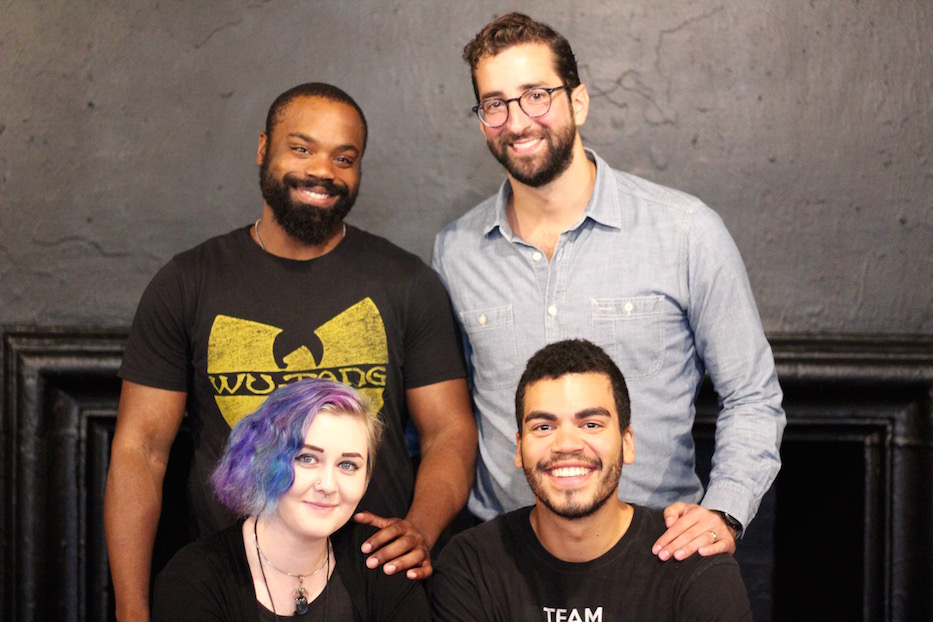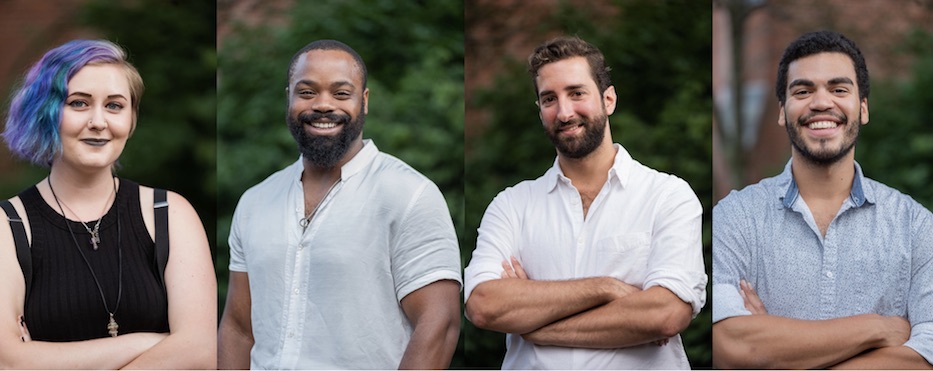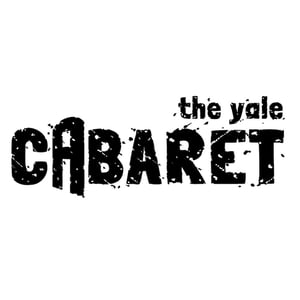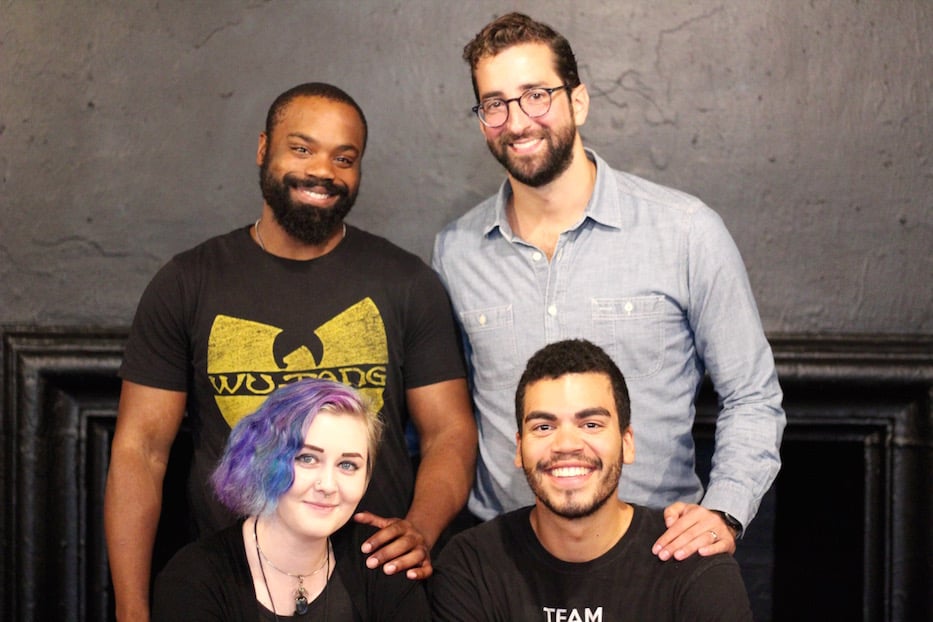
Culture & Community | Arts & Culture | Theater | Yale Cabaret

| From left to right: Alex Vermillion, Brandon E. Burton, Jaime Totti, and Zachry J. Bailey. Photo courtesy of the Yale Cabaret. |
First they’ll show the audience that the wall is there. Then they’ll look at the cracks one by one, and dip their hands into the cracks and wobbly spots. Maybe a section will come tumbling down on its own. Maybe they’ll have to set it on fire. Maybe the audience will jump in to help. But it’s going to come down, one way or another.
That’s the plan for the new artistic team at the Yale Cabaret, now in its 52nd season at the Yale School of Drama. As the 2019-2020 academic year gets underway, team members said this week that they plan to start the season by introducing audiences to their own “wall of [theatrical] defense,” then taking that wall down.
The team comprises Co-Artistic Directors Zachry J. Bailey, Brandon E. Burton, and Alex Vermillion, Managing Director Jaime Totti, and several artistic associates. The four have also appointed three new “champions”—Wellness Champion Emily Sorensen, Education Champion Madeline Charne, and Community Champion Malia West—with the hope of engaging both the Yale and New Haven communities. Chef Dana Cesnik Doyle of Queen of Tarts Catering will be returning for a second year.
“I’m really excited about our upcoming season,” Vermillion said in an interview earlier this week at the theater’s intimate Park Street digs. “There’s new work, there’s dance performance, there’s really experimental things happening.”
Those performances, of which six have been planned and 12 are still open, begin this month with Jackie Sibblies Drury’s We Are Proud to Present A Presentation About the Herero of Namibia, Formerly Southwest Africa, from the German Südwestafrika, Between the Years 1884-1915, which the cab first took on five years ago during the summer of 2014. Published in 2012, the work recounts the Herero and Nama genocide waged in modern day Namibia at the beginning of the twentieth century as a play within a play.

It’s bitterly funny until it’s not, leaving the audience to grapple with colonial history as it repeats itself. In an interview this week, team members said that starting with Drury’s nesting doll of a play felt like a logical fit, despite the emphasis on devised and experimental works that dominates much of the season. It will be directed by Christopher Betts, a second year graduate student in directing at the Yale School of Drama.
“It’s an established work, but it takes a lot of liberties with the theatrical structure of traditional storytelling, as well as embracing questions and social mores that we’re uncomfortable asking ourselves and each other,” Burton said. “That’s a big reason why it made sense to be the first show. It touches on a lot of our values, and will open the conversation up in a way that I don’t think the school, or even the greater New Haven community, has addressed.”
But as it closes that work, the cab will be stepping into devised and deeply experimental territory through the end of October. In part, Burton said, that emphasis is meant as a direct counter to “this sort of lack of trust” that he sees in American regional theater (he just finished stints with Shakespeare & Company and Pennsylvania Shakespeare Festival), where directors may play it safe to protect both audiences and their bottom line.
“That sort of vanguard aspect that was a part of regional theater’s inception has gone missing,” he said. “It’s sort of on the back of milk cartons. And we’re in search of that spirit, in a lot of ways.”
In Waste // Land: Climate Change Theatre Action 2019 (Sept. 19-21), the Yale group Beyond Borders will be diving into a performance that blends dance, theater, devised movement, installation and short plays for “an anthology” on climate change, Vermillion said. The work is presented as part of Climate Change Theater Action, a project of The Arctic Cycle that is based in New York City and Alaska but has projects across the country.
The piece will be followed by benjisun presents bodyssey (Oct. 3-5), an evolving work from students Benjamin Benne and Jisun Kim on which Bailey will serve as the dramaturg. After seeing the work last year during the Cab’s annual Satellite Festival and then again during a series of “passion projects,” he became enamored of it because it kept him guessing with no words at all.
One moment, Kim was onstage moving to live music from fellow student and sound designer Emily Duncan Wilson. The next, she was blowing bubbles in a cup. The next, she and Benne were bringing audience members up onstage. There were never words. There never needed to be.
“There’s a world in which it is more accessible with the lack of language, and then arguable inaccessible because it’s movement,” Bailey said. “And so [we’re] exploring what that means.”
The following week (Oct. 10-12), the fourth show of the season will weave together traditional storytelling, sexual trauma and campus rape culture in Doireann Mac Mahon’s How To Relearn Yourself, an original work that takes on an current epidemic of sexual violence, and explores it with narrative tradition from multiple actors.

| Lucy Gellman Photo. “None of the art we make is gonna change the world,” Burton said during the interview. “It’s not. Like, definitively, the art that we make will not change the world. But the audiences that see the art, they’re the ones that will go out and change the world. So how can we curate experiences that leave people charged when they leave our doors?” |
With both shows four and five—Lucas Hnath’s Red Speedo (Oct. 24-26), which tracks an elite athlete at an ethical crossroads—team members said they are excited to have a new wellness champion in Sorensen, who will be using her role to reach out to wellness-focused partner organizations for programming. In particular, the cab will be partnering with the university’s new Good Life Center to spark discussions around mental health and pressure-cooker environments, which span Ivy League athletics to graduate education.
“We really don’t talk a lot about the emotional and physical impact that playing highly competitive sports, and participating in highly competitive sports, can have on a human being,” Burton said. “We want to speak to these communities, and part of this community building is understanding that we have way more in common than we do in difference.”
On Halloween weekend (Oct. 31-Nov. 2), the cab returns with JJ McGlone’s newly devised Burn Book, which Vermillion described as “a new adaptation and mash-up of The Crucible, Mean Girls, and The Craft.” In the show, male queerness collides full on with witchcraft, monstrosity and the grotesque, pushing beyond a pop cultural tilt that includes Jennifer Kent’s Babadook, the long history of monster drag, and overlaps between the occult and queerness.
“Yes, it’s funny as hell,” said Vermillion, who identified as "both queer and a witch" as ze described the show. “Yes, it’s going to be a blast to be a part of. But also, the conversation about being queer in this space, dealing with gender and witchcraft and being in school and having all these pressures, and also being an outcast, all of these things are meeting in this play.”
The remaining 12 plays of the season have yet to be determined. As the four embark on a packed lineup, they see their work as twofold: bridging gaps within the Yale School of Drama and the university, and reaching out to the greater New Haven community, which previous teams at the Cab have done with varying success. Programming is built on four pillars: the cabaret as a door, the cabaret as a path, the cabaret as a key, and the cabaret as sanctuary.
“One of our core ideals is community, and the understanding that we’re all in the same place, breathing the same air, and nothing will get done if we don’t help each other out,” Burton said.
But they also plan to expand that notion of community, with new initiatives intended to bring in a wider and more diverse segment of both Yale and New Haven. In addition to performances for young audiences and the theater’s annual Satellite Festival, both which have grown in the past few years, team members are curating “dark night” events specifically for the 12 weeks this academic year that the cab is “dark,” or doesn’t have a show.
One week, a dark night might involve a game night for fellow graduate students from the School of Drama. Another, there might offer guided meditation and yoga. The series, which Vermillion referred to as carefully curated with performances in mind, also includes a new partnership with the Yale Center for the Study of Race, Indigeneity, and Transnational Migration (RITM), which has come on as one of the cab’s season sponsors and is organizing a series of conversations.
The team is also planning an art gallery for the theater’s Park Street lobby and hallway, filled with work by both student and community artists. In part, Totti said, that’s a nod to previous cab teams who have taken an interdisciplinary approach to the art that they put on and around their stage.
“We know that everybody has some kind of artistic impulse,” he said. “Everybody has a sense of beauty. A lot of people are working on art outside of the sort of, like, codified power structure of which Yale is very much a part. And we think that the Cabaret can make space for that.”
In the greater New Haven community, that work will also include an invitation to New Haven organizations to use the space, which Bailey called long overdue. As the cab’s “Community Champion,” West will be reaching out to local organizations, building partnerships meant to invite in new audiences.
Later this season, team members are also planning to hold a food drive for Thanksgiving, a toy drive for Christmas, and partner with the Sex Workers and Allies Network (SWAN) for the group’s annual Valentine’s Day event.
“It’s an ambitious project for the year, but I think that we can make it work,” Totti said. “It’ll work in whatever form it ends up taking. But the passion behind it is real, and it ends up driving everything that we’re trying to do here.”
Cab 52 opens with Sept. 12 with Jackie Sibblies Drury's We Are Proud to Present a Presentation About the Herero of Namibia,FormerlyKnown asSouthwest Africa, From the German Südwestafrika, Between the Years 1884–1915. For tickets and more information, visit www.yalecabaret.org.
In addition to its full season of staged productions, the cabaret will open its space when available to outside groups for community-building activism and artistic activities. Interested groups should email ysd.cabaret@yale.edu for more information.

